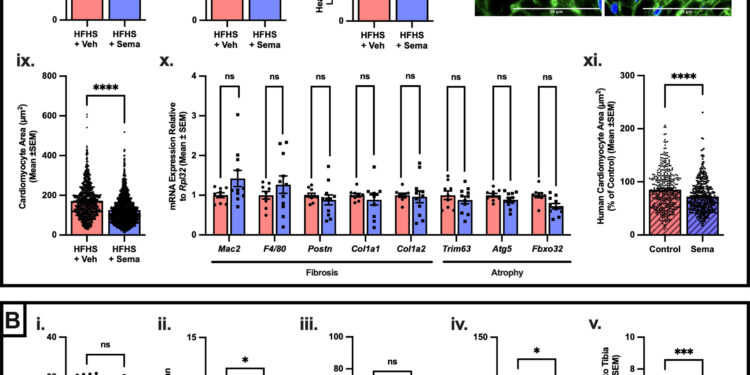The effects of semaglutide in obese and lean mice. Credit: JACC: basic to translational science (2024). DOI: 10.1016/j.jacbts.2024.07.006
Trendy weight-loss drugs that make headlines for shrinking waistlines could also shrink the human heart and other muscles, according to a new study from the University of Alberta. JACC: basic to translational science. The authors say the research should serve as a “cautionary note” about the possible long-term health effects of these drugs.
“If these drugs were prescribed to people, the benefits would likely far outweigh the risks,” says lead study author Jason Dyck, professor of pediatrics in the School of Medicine and Dentistry and a member of the Women’s and Children’s Health Research Institute. .
“However, the growing number of people who may be taking these medications, who do not meet the eligibility criteria and who are not at risk, have a different risk-reward calculation that they should be aware of.”
Dyck and his team set out to study why one of the reported side effects of the leading weight loss drug Ozempic is loss of skeletal muscle.
Ozempic, known medically as semaglutide, was initially designed to help adult patients with type 2 diabetes control their blood sugar levels. However, this drug – and many others in this drug class – are also touted for their effectiveness as an anti-obesity drug.
Using mice for the study, researchers found that heart muscle decreased equally in obese and lean mice. The systemic effect observed in mice was then confirmed in cultured human heart cells.
Dyck, Canada Research Chair in Molecular Medicine and director of the Center for Cardiovascular Research, says his team observed no adverse functional effects on the hearts of mice with smaller hearts and would therefore not expect clear effects on human health. But he adds that the impact could be greater in the long term, or that certain forms of cardiac stress could have a detrimental effect that was not observed at rest.
“Given the increasing number of people taking this medication who do not have any cardiovascular disease or are not classified as obese, we suggest that cardiac structure and function be carefully evaluated in previous and ongoing clinical studies.”
Dyck’s study follows a commentary published in the November issue of The Lancet by an international team of researchers from the University of Alberta, McMaster and Louisiana State University, who reviewed emerging research showing that up to 40% of the weight lost by people using weight-loss drugs is actually muscle.
Carla Prado, a nutrition researcher at the Faculty of Agricultural, Life and Environmental Sciences and lead author of the commentary, explains that this rate of muscle decline is significantly higher than is typically seen with diets. Low-calorie diets or normal aging and could lead to a host of long-term health problems, including decreased immunity, increased risk of infections and poor wound healing.
“Muscle does much more than just help us move or lift things. It’s a powerful organ that keeps us healthy in many ways,” she says.
For example, muscles store important building blocks – amino acids – that the body uses when we are sick, stressed or injured to repair itself and stay strong. It also plays an important role in managing blood sugar levels, which helps prevent diabetes.
Additionally, Prado notes that muscles release special molecules called myokines that signal other parts of the body to help fight infections and support our immune system.
“This is why muscle preservation is so important, especially during weight loss treatments: it’s not just about staying strong, but keeping our whole body resilient and healthy.”
In the commentary, the authors suggest that muscle loss due to weight loss may also exacerbate conditions such as sarcopenic obesity, characterized by a combination of high body fat and low skeletal muscle mass, which contributes to less good health outcomes, including cardiovascular disease and higher mortality rates. .
Although the short-term effects of muscle loss on physical strength and function remain unclear, the commentary calls for future research to explore how reducing muscle mass could improve muscle mass and composition.
To keep muscles strong while losing weight, Prado says it’s essential to focus on two main things: nutrition and exercise. Good nutrition means consuming enough high-quality protein, essential vitamins and minerals, and other nutrients for muscle building. Sometimes this may include protein supplements to ensure the body has what it needs.
“Exercise is equally important, especially resistance training like lifting weights or using resistance bands,” said Prado, who was recently named Canada Research Chair in Integrative Nutrition, Composition body and energy metabolism. “This type of exercise helps prevent muscle breakdown during weight loss and maintain strength.”
She adds that for anyone using weight loss medications, it’s best to follow a balanced program that includes both enough protein and resistance training.
“It can help people lose fat while minimizing muscle loss, helping them reap the full health benefits of treatment and stay strong.”
More information:
Matthew D. Martens et al, Semaglutide reduces cardiomyocyte size and heart mass in lean and obese mice, JACC: basic to translational science (2024). DOI: 10.1016/j.jacbts.2024.07.006
Provided by University of Alberta
Quote: Weight-loss drug that shrinks heart muscle in mice and human cells (November 20, 2024) retrieved November 20, 2024 from
This document is subject to copyright. Except for fair use for private study or research purposes, no part may be reproduced without written permission. The content is provided for informational purposes only.



